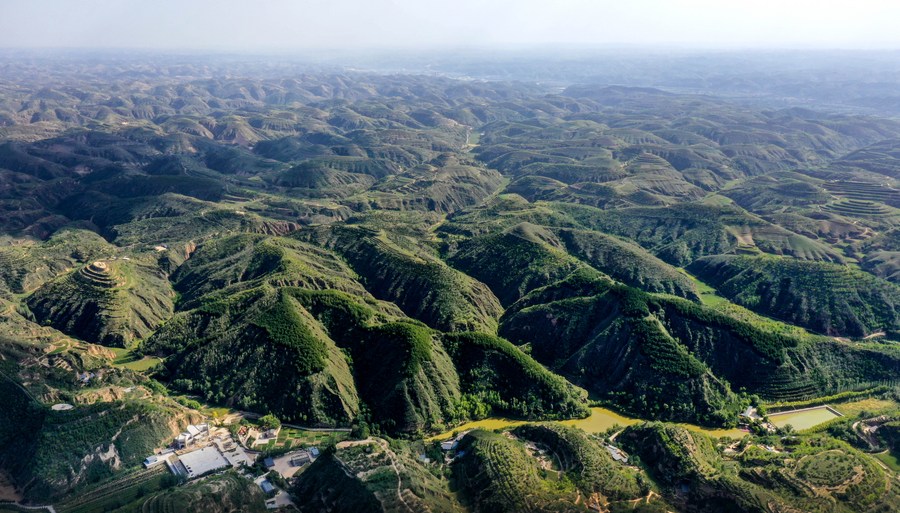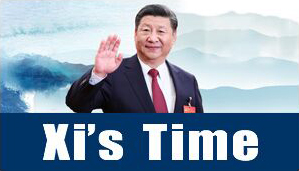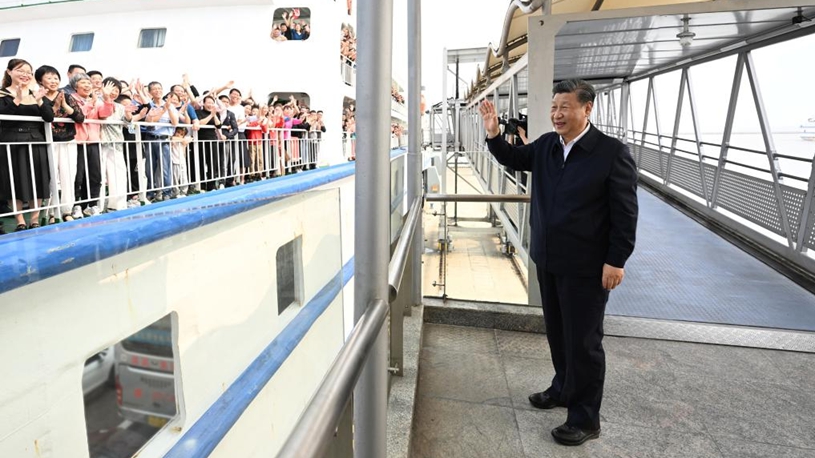
Aerial photo taken on Sept. 10, 2021 shows the scenery of Gaoxigou Village in Mizhi County, northwest China's Shaanxi Province. (Xinhua/Tao Ming)
BEIJING, April 17 (Xinhua) -- On Sept. 13, 2021, Gao Zhizhou experienced an unforgettable stroke of serendipity. While he was buried amid flourishing crops, busy managing weeds, he was surprised by an unexpected visitor -- President Xi Jinping.
Xi, also general secretary of the Communist Party of China (CPC) Central Committee and chairman of the Central Military Commission, was on his way to Gaoxigou, a once-impoverished village in the northwestern province of Shaanxi, for inspection.
While driving alongside the road, the sprawling farmland under the early autumn sun caught Xi's attention, prompting him to stop by the fields.
There, he picked up earheads of millet and squeezed corn to check the growth of autumn grain. This is where Xi chatted with Gao and his other fellow villagers.
"Have you intercropped the grain with soybeans?" Xi asked.
"Not this year. There was not much rain," Gao replied.
"The general secretary understood our dialect. And he knows about the lives of us farmers very well," the villager recounted his encounter with Xi.
It is not at all surprising that Xi is familiar with the local dialect and the life of a farmer.
In 1969, during his teenage years, Xi moved to Liangjiahe, an impoverished Shaanxi village about 150 km away from Gaoxigou. He lived and worked there for seven years and witnessed firsthand how the villagers struggled to provide for themselves. At that time, he wanted more than anything to make it possible for the villagers to "have meat on their plates."
During his inspection trip to Gaoxigou, Xi expressed great satisfaction in seeing the significant improvements in the lives of rural communities living on the Loess Plateau.
Thanks to the decades-long ecological conservation efforts led by the CPC, Gaoxigou, which was once marred by severe soil erosion, is now covered in lush green vegetation. Trees, grass and crops now thrive on what was once barren land, and the days of food scarcity for Gaoxigou's residents are now a thing of the past.
"Today, we can have white flour, rice and meat if we want," the villagers told Xi.
Since assuming the Party's top job in November 2012, Xi had been to farmlands during multiple inspection trips across the country, setting an example of conducting fact-finding research. Over the years, his initial goal of ensuring that locals had enough to eat has evolved into a more ambitious vision of securing China's food supply.
During last year's "two sessions," Xi visited national political advisors and called for adopting an all-encompassing approach to food, which was also written into the report to the 20th CPC National Congress last October.
"While ensuring grain supply, we must also guarantee an effective supply of various food items, including meat, vegetables, fruits, and aquatic products. None of them should be lacking," Xi told the political advisors, emphasizing that food security is an issue that goes beyond the cultivation of crops alone.
Visiting the Yazhou Bay Seed Laboratory while inspecting south China's Hainan Province in April 2022, Xi stressed the importance of pursuing agricultural technological breakthroughs to achieve self-dependence in the seed sector. "We should rely on Chinese seeds to ensure China's food security," he said.
During his inspection to south China's Guangdong Province last week, Xi visited a mariculture base where he called for elaborate efforts in developing the breeding industry as it serves as the foundation for modern agriculture and aquaculture development. He underscored the importance of making use of both land and sea resources to produce food for the people.
The latest trip followed the launch of a Party-wide campaign to conduct in-depth research and study to identify and resolve major problems that could hamper China's high-quality development and modernization drive. ■





